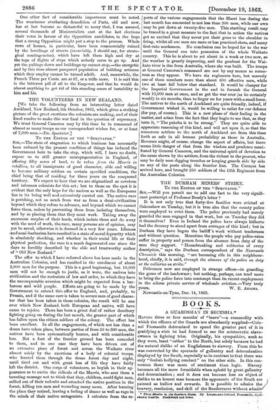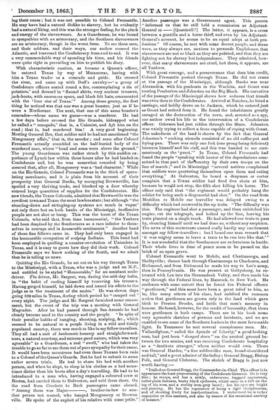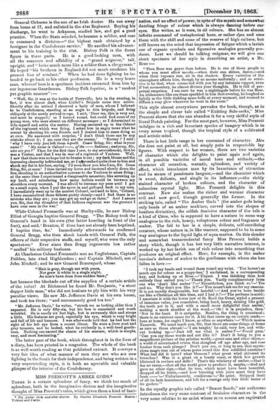BOOKS.
A GUARDSMAN IN SECESSIA.* HAVING three or four months' of "leave"—a commodity with which the officers of the Guards are abundantly supplied—Colo- nel Fremantle determined to spend the greater part of it in gratifying a wish he had formed to see the aristocratic slave- owners in fighting trim. Originally, his sympathies, such as they were, leant "rather" to the North, but solely because he had the natural dislike of an Englishman to slavery. From this he was converted by the spectacle of gallantry and determination displayed by the South, especially as in contrast to that there was only "foolish bullying conduct" on the other side. In this con- version there was more of sentiment than logic. Slavery becomes all the more formidable when upheld by great gallantry and determination ; and it does not become less an object or
dislike to an honest man because the opponents of the South are painted as bullies and cowards. It is possible to admire thev bravery, resolution, and skill of the Southerners without aduairi
* Three Months in the Southern &aim By lioutausat•Colonel Fremantle, coil; AMER Guards. Blackwood aud Sous.
ing their cause ; but it was not possible to Colonel Fremantle. He may have had a natural dislike to slavery, but be evidently had a natural liking, and this was the stronger feeling, for the pluck and energy of the slaveowners. As a Guardsman, he was bound to sympathize with an aristocracy, and the Southern slaveowners are an aristocracy, though in the worst form. To see these men, and their soldiers, and their ways, our author crossed the Atlantic, and traversed the Confederacy from end to end. It was a very commendable way of spending his time, and his friends were quite right in prevailing on him to publish his diary.
With characteristic caution, as became a Queen's officer, he entered Texas by way of hfatamoras, having with him a Texan trader as a comrade and guide. He crossed the river, and came up with Duff's cavalry—" a group of Confederate officers seated round a fire, contemplating a tin of potatoes," and dressed in "flannel shirts, very ancient trousers, jack-boots, with enormous spurs, and black felt hats, ornamented with the 'lone star of Texas." Among these gentry, the first thing he noticed was that one was a great boaster, just as if he were a Northerner. The next, that one of this same boaster's comrades—whose name we guess—was a murderer. He had a few days before crossed the Rio Grande, kidnapped what he called a" renegado," that is, a Unionist, and left him on the road ; that is, had murdered him! A very good beginning. Meeting General Bee, that soldier said he had not sanctioned "the Mongomery affair," that is, the murder ; and soon after Colonel Fremantle actually stumbled on the half-buried body of the murdered man, whose "head and arms were above the ground." The young Guardsman was rather struck by this sudden ex- perience of Lynch law within three hours after he had landed on Confederate soil, but he was somewhat consoled by being assured that, after all, Mongomery was a "bad character." While on the Rio Grande, Colonel Fremantle was in the thick of specu- lating merchants, and it is plain from his account of their prosperity that General Banks, by occupying Brownsville, has spoiled a very thriving trade, and blocked up a door whereby entered large quantities of supplies for the Confederates. His new friends, the Texan Colonels, admitted that Brownsville was the rowdiest town and Texas the most lawless state; but although "the shooting-down and stringing-up systems are much in vogue" not only there but on both banks of the Mississippi, inoffensive people are not shot or hung. This was the boast of the Texan Colonels, who said that, from time immemorial, "the Yankees had been despised by the Southerners as a race inferior to them- selves in courage and in honourable sentiments." Another band of these fine fellows came in. They had only been engaged in the honourable occupation of scalping Indians. This band had been employed in quelling a counter-revolution of Unionists in Texas, and it is easy to guess how they did their work. Colonel Fremantle says we know nothing of the South, and we admit that he is telling us news.
Quitting the Rio Grande, he set out on his way through Texas to the Mississippi, with a Texan, who was a judge and an and entitled to be styled "Honourable," for an assistant mule- driver. The driver, Mr. Sargent, was, during the mid-day halts, in. "the habit of cooling himself by removing his trousers. Having gorged himself, he laid down and issued his edicts to the judge as to the treatment of the mules." He was eleven days going 330 miles in Texas, during which period he "camped out" every night. The judge and Mr. Sargent furnished some amuse- ment, but the event of the trip was a meeting with General Magruder. After he had passed through San Antonio he had clearly become used to the country and the people. "In spite of their peculiar habits of hanging, shooting, scalping, &c., which seemed to be natural to a people living in a wild and thinly populated country, there was much to like in my fellow-travellers. They all had a sort of bonhommie honesty and straightforward- ness, a natural courtesy, and extreme good nature, which was very agreeable" to a Guardsman, a real "swell," who had taken the trouble to go so far to see them out of pure sympathy for their cause. It would have been monstrous had even these Texans been rude to a Colonel of the Queen's Guards. But he had to submit to some rather severe trials. He had to share his bed with another person, and when he slept, to sleep in his clothes on a bed some- times dirtier than his boots after a day's travelling. He bad to be introduced to a man who, having engaged a coloured crew at Boston, had carried them to Galveston, and sold them there. On the road from Crockett to Rusk passengers came aboard.
"Among them was Major , brother-in-law to ano- ther person not named, who banged Mongomery at Browns- ville. He spoke of the exploit of his relative with some pride." Another passenger was a . Government agent. This person "informed U8 that he still held a commission as Adjutant-
General to — [Quantrell?) The latter, it appears, is a cross between a guerilla and a horse thieP, and even by his Adjutant- General's account, he seems to be an equal adept at both pro- fessions." Of course, he met with some decent people, and these were, as they always are, anxious to persuade Englishmen that slaveowners are not so black as they are painted, and that they are fighting not for slavery but independence. They admitted, how- ever, that many slaveowners are cruel, but these, it appears, are all Yankees.
With great courage, and a perseverance that does him credit, Colonel Fremantle pushed through Texas. He did not crane at the passage of the Mississippi, although Banks was near Alexandria, with his gunboats in the Wachits., and Grant was routing Pemberton and Johnston on the Big Black. His narrative
of the passage of the Mississippi shows bow arduous that transit was even then to the Confederates. Arrived at Natchez, he hired a
carriage, and boldly drove on to Jackson, which he entered just as Grant had retired from it. He found the inhabitants greatly enraged at the destruction of the town, and, arrested as a spy, our author owed his life to the intervention of a Confederate officer. Grierson had just ridden through the State. Johnston was vainly trying to collect a force capable of coping with Grant. The nakedness of the land is shown by the fact that General Johnston's "cooking utensils consisted of an old coffee-pot and frying-pan. There was only one fork (one prong being deficient) between himself and his staff, and this was handed to me cere- moniously as the 'guest." In Texas, Colonel Fremantle had found the people "speaking with horror of the depredations com- mitted in that part of thertountry by their own troops on the line of march ;" and in Mississippi "several natives complained that soldiers were quartering themselves upon them and eating everything." At Galveston, he beard a drayman or carter complain that a Texan soldier had fired five shots at him, because he wonld not stop, the fifth shot killing his horse. The officer only said that "the regiment would probably hang the soldier for being such a disgraceful bad shot." On the road from Meridian to Mobile our traveller was delayed owing to a difficulty which had occurred in the up train. "The difficulty was this. The engineer had shot a passenger, and then unhitched his engine, cut the telegraph, and bolted up the line, leaving his train planted on a single track. He had allowed our train to pass by, shunting himself until we had done so, without any suspicion.
The news of this occurrence caused really hardly any excitement amongst my fellow-travellers ; but I heard one man remark that 'it was mighty mean to leave a train to be run into like that.'" It is not wonderful that the Southerners are so ferocious in battle.
Their whole lives in time of peace seem to be passed on the brink of an open grave.
Colonel Fremantle went to Mobile, and Chattanooga, and Shelbyville ; thence back through Chattanooga to Charleston, and Richmond, and from Richmond he made his way to Lee's army, then in Pennsylvania. He was present at Gettysburg, he re- treated with Lee into the Shenandoah Valley, and then made his way through the Federal lines, by Hancock, to New York. He confesses with some nafvete that he found the Federal officers "gentlemen," and this must have been a great relief to him, as he, like many others of his class, had imbibed the common
notion that gentlemen are grown only in the land which gave birth to Preston Brooks, and holds that man's memory in honour. He found, however, for the credit of humanity, that there were gentlemen in both camps. There are in his book some very agreeable sketches of persons and incidents, and we are enabled to see some of the Southern leaders in the most favourable light. In Tennessee he met several conspicuous men. Mr. Vallandighatn, " called the Apostle of Liberty," a good-looking
man, had just been "dumped down" on the neutral ground be-
tween the two armies, and was receiving Confederate hospitality as a "destitute stranger," whom neither would own. There was General Hardee, "a fine soldier-like man, broad-shouldered and tall," and a great admirer of the ladies ; General Bragg, Bishop Polk, and General Cleburne. The sketch of Bragg is just now worth having :—
"Icalled on General Bragg, the Commander-in-Chief. This officer is in appearance the least prepossessing of the Confederate Generals. Ile is very thin ; he stoops, and has a sickly, cadaverous, haggard appearance, rather plain features, bushy black eyebrows, which unite in a tuft on the top of his nose, and a stubby iron-grey beard ; but his eyes are bright and piercing. He has the reputation of being a rigid disciplinarian, and of shooting freely for insubordination. I understand he is rather unpopular on this account, and also by reason of his occasional acerbity of manner." General Cleburne is the son of an Irish doctor. He ran away from home at 17, and enlisted in the 41st Regiment. Buying his discharge, he went to Arkansas, studied law, and got a good practice. When the State sec.eded, he became a soldier, and rose to command a division—" the highest rank obtained by a foreigner in the Confederate service." He ascribed his advance- ment to his training in the 41st. Bishop Polk is the finest figure in these parts. He is a good.looking man, with all the manners and affability of a "grand seigneur," tall, upright, and "looks much more like a soldier than a clergyman." He hoped "his brethren in England did not much condemn his present line of conduct." When he had done fighting be in- tended to go back to his other profession. He is a very brave man, whereof here is a specimen incident extracted from him by our ingenuous Guardsman. Bishop Polk loquitur, in a "modest yet graphic manner" :— "Well, Sir, it was at the battle of Perryville, late in the evening, in fact, it was almost dark, when Liddell's Brigade came into action. Shortly after its arrival I observed a body of men, whom I believed to be Confederates, standing at an angle to this brigade, and firing obliquely at the newly arrived troops. I said, 'Dear me, this is very sad, and must be stopped ;' so I turned round, but could find none of my young men, who were absent on different messages • so I determined to ride myself and settle the matter. Having cantered up to the Colonel of the regiment which was firing, I asked him in angry tones what he meant by shooting his own friends, and I desired him to cease doing so
at once. He answered with surprise, don't think there can be any mistake about it ; I am sure they are the enemy.' "Enemy 1' I said ;
why I have only just left them myself. Cease firing, Sir; what is your name ? "My name is Colonel—, of the— Indiana ; andpray, Sir, who are you l' Then for the first time I saw, to my astonishment, that he was a Yankee, and that I was in rear of a regiment of Yankees. "Well, I saw that there was no hope but to brazen it out ; my dark blouse and the Increasing obscurity befriended me, so I arlproached quite close to him and shook my fist in his face, saying, soon show you who I am, Sir. Cease firing, Sir, at once.' I then turned my horse and cantered slowly down the line, shouting in an authoritative manner to the Yankees to oease firing ; at the same time I experienced a disagreeable sensation, like screwing up my back, and calculating how many bullets would be between my shoulders every moment. I was afraid to increase my pace until I got to a small copse, when I put the spurs in and galloped back to my men. I immediately went up to the nearest Colonel, and said to him, 'Colonel, I have reconnoitred those fellows pretty closely—and I find there is no mistake who they are ; you may get up midge at them." And I assure you, Sir, that the slaughter of that Indiana regiment was the greatest I have ever seen in the war."
While Colonel Fremantle was at Shelbyville, he saw Bishop Elliot of Georgia baptize General Bragg. "The Bishop took the General's band in his own (the latter kneeling in front of the font), and said, Braxton, if thou bast not already been baptized, I baptize thee, &c.' Immediately' afterwards he confirmed General Bragg, who then shook hands with General Polk, the officers of their respective staffs, and myself, who were the only spectators." Ever since then Bragg regenerate has rather "mulled" his military business.
At Charleston Colonel Fremantle met an Englishman, Captain Feilden, late 42nd Highlanders ; and Captain Mitchell, son of John Mitchell; and be saw General Beauregard, whose
"Hair is grey, though not with years, Nor grew it white in a single night,
As men's have done from sudden fears;" but because the blockade cut off the supplies of a certain article of the toilet! At Richmond he found Mr. Benjamin, "a stout dapper little man," who did not hesitate to ply him with his very peculiar views. He saw Mr. Jefferson Davis at his own house, and took tea there; "and uncommonly good tea too."
"Mr. Jefferson Davis," he writes "struck me as looking older than I expected. He is only fifty.six, hut his face is emaciated and much wrinkled. He is nearly six feet high, but is extremely thin and stoops a little. His features are good, especially his eye, which is very bright and fall of life and humour. I was afterwards told that he had lost the sight of his left eye from a recent illness. He wore a linen coat and grey trousers, and he looked, what he evidently is, a well-bred gentle- man. Nothing can exceed the charm of his manner, which is simple, easy, and most fascinating."
The latter part of the book, which throughout is in the form of a diary, has been printed in a magazine. The whole of the book is as well worth reading as that published extract. It conveys a very fair idea of what manner of men they are who are now fighting in the South for their independence, and being written in a very unpretending style, it is both an agreeable and valuable glimpse of the interior of the Confederacy.




































 Previous page
Previous page